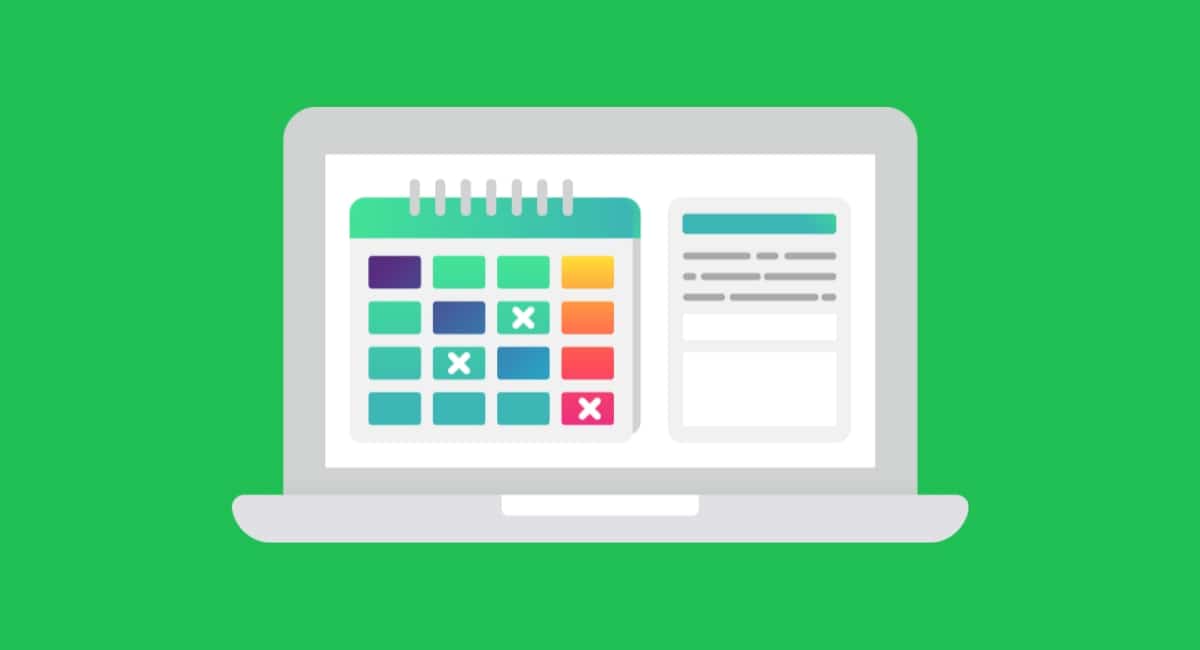The amount of online booking systems has flourished, so it can be overwhelming to distinguish them and know what features to look for in one.
Firstly, we should highlight the primary purpose of an online booking system: to accept bookings online and automate the processes around it.
Modern booking software should be cloud-based and update calendars in real time as bookings happen and change. They should also have a range of automatic processes like appointment reminders and a payment process. These are things that save time, as opposed to doing everything manually.
Salons, event managers and other types of businesses need slightly different functions, but a lot of it overlaps between sectors. A generic booking system may not distinguish between webinars, classes, appointments or services, but a really efficient one has features important for the service you offer.
We’ve identified twelve important factors that should help you evaluate scheduling software.
Different types of bookings
Companies tend to offer more than one type of service. The software solution should let you list all the different services, events or classes you offer rather than just block out time for one generic sort of booking.
Apart from creating different types of bookings, you might also need to group them and link each to the team member who’s responsible for it. When you create an individual service, there should also be options to tailor its duration, description, category and anything else that applies to the business.
Cancelling and rescheduling appointments
The ability to cancel an appointment is more complicated than you might assume. A booking system should have the option to tailor customers’ cancellation notices, such as requesting a 48 hours’ notice to get a refund for the booking.
It should also be easy for customers to cancel or reschedule if they give enough notice. The business may need to reschedule or cancel events themselves, which should automatically be communicated to the customer through relevant channels.
Upfront payments, deposits and no-shows
How do you ensure someone doesn’t just book a service, then doesn’t turn up? Many services require a full payment at the time of booking, or request a partial payment (deposit) that won’t be returned to the customer in case of a no-show.
A no-show policy is important to communicate through the scheduling flow, especially if you don’t refund money paid upfront or keep customers’ card details temporarily as a backup. The latter lets you charge a no-show fee, as long as you have stated this beforehand to the customer in the booking flow.
Integrated payments
Charging upfront for online bookings requires an online payment system. That is unless you’re okay with personally communicating payment instructions to customers who might not follow through with it.
Online scheduling systems usually have a checkout page that finalises a booking by processing the payment for it. Accepted options could include credit and debit cards, PayPal and Klarna, but this completely depends on the solution and which payment processors it integrates with.
Each payment company has their own transaction fees, some higher than others (especially for cross-border payments). It also varies how fast you can access transactions and if payouts settle in an online account or bank account. Make sure you are happy with the payment solution before you commit to it.
Automated emails and texts
A significant part of online scheduling is the messaging flow that comes with it. No longer do you have to manually message or call clients to confirm an appointment – now, it is all taken care of through automated emails or text messages.
Each business has their communication preferences, but certain types of messaging are standard. For instance, a confirmation email or text is normally sent to the customer when a booking is made. Appointment reminders leading up to the event are another staple in booking software that helps prevent no-shows.
The business might also want to, for example, receive emails when a new booking is placed, payment is made or appointment rescheduled. The more choice you have to customise these messages, the better your needs can be met.
Calendar sync with Google, Outlook etc.
Many people use an online calendar to be reminded of appointments and plans. It’s common for booking systems to integrate with some of these, so appointments can be added to them. This will help both customers and businesses to remind themselves of upcoming events.
Some of the most popular calendars to sync with are the Google, Outlook and Apple iCloud calendars. The more of these your booking system syncs with, the merrier, but do at least choose a solution that links with the main ones.
Integration with marketing and add-on tools
Many businesses link their booking system with marketing tools, website analytics, accounting software etc. according to what’s needed. You should consider which tools would be useful and choose a solution that either offers these within the platform or connects with external software that does.
For example, premium booking systems also include email marketing features and customer profiles, which help nurture relationships with clients. Customer loyalty tools may also include promotions and surveys following an appointment for suggestions on how to improve the service.
Website integration
Do you have a website already or need to build one? Some scheduling systems include a website builder so you can build one that perfectly fits with the style of its calendar. It usually makes things easier if you manage both the website and bookings on the same platform.
Other solutions just manage the booking system, in which case it should integrate with your existing website or work as a standalone booking flow you can link to from Google, social media or elsewhere online.
Team profiles
Beauty salons, yoga studios and others with teams should have a way to allocate bookings to individual tutors, stylists, masseuses etc. Even better, if the booking system allows multiple user accounts, each staff member can check and manage their schedule directly.
User profiles can also provide valuable statistics about how team members are doing compared with others, so you might perhaps tweak prices and types of service offered by under-booked staff. Some systems even include a tipping system that automatically splits tips between employees.
Customising the booking flow
Certain scheduling systems can be rigid when it comes to the actual booking flow that the customer goes through. Ideally, you should be able to customise this to suit your type of business, client expectations and how you wish to communicate a service.
For example, it’s sometimes useful to include an information page or contract that the customer has to read and approve with a tick in a box. Health professionals and counsellors, for example, will need to state certain things to prove their commitment to confidentiality and duty of care.
App for managing appointments
Not everyone can manage a business promptly from the comfort of a desk and computer. Busy professionals are often out and about, in which case it’s a good idea to choose a booking system you can manage in a smartphone app.
Most scheduling software has an app for urgent functions and a real-time overview of booking statuses, though complicated things like setting up email campaigns and editing a website probably requires a laptop.
Different languages
Accommodation businesses like bed and breakfasts, hotels, campsites and holiday rentals are likely to get visitors from abroad trying to book a stay. This sort of booking – among other types that non-English speakers might place – will benefit from a dynamic language setting.
Some booking systems can display the client’s language by detecting their browser language or location. This increases the user’s likelihood of finalising the booking, as they’ll be able to understand the instructions and booking details without doubts. If the customer can pay in their own currency, that’s even better.
Other features
Of course there are other features that can be equally important for a business, in specialised fields particularly. You can choose scheduling software that understands your sector, such as Mindbody for wellness practitioners and Square Appointments that links to retail features.
Some businesses benefit from customer profiles stored in a database (good with recurring customers), others benefit a lot from offering vouchers and gift cards for bookings. If you sell physical products like shampoos or books as well as bookings, the system should accommodate for that too.
In light of this list, note the things you need and let that guide in your search for the best booking app.




